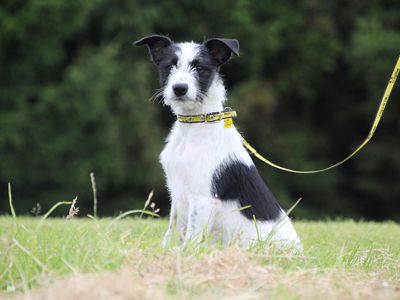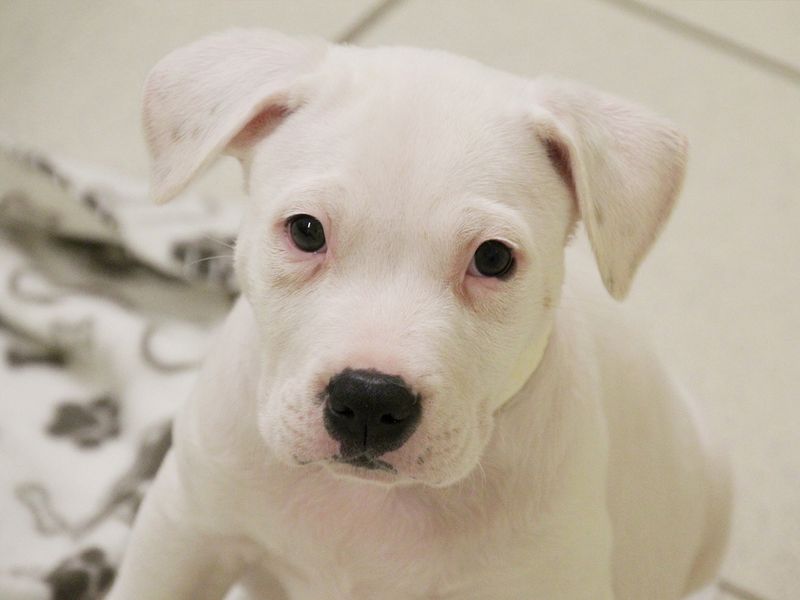
Buying a dog or puppy safely
If you’re buying a puppy, our guide covers where to buy one, the key questions to ask, and what to look out for.

Once you’ve found a responsible breeder who puts the health and welfare of the pups first, it’s time to plan how you’ll buy your puppy safely.
Where to buy a dog
Buying a dog online comes with lots of risks. So, it’s important to do your research on reputable breeders. The Kennel Club’s Assured Breeder scheme can help you find breeders who have all been inspected by the Kennel Club. They’re continually monitored to make sure they maintain the set standards outlined by the organisation. However, it’s still important to do your own checks when visiting, even for Kennel Club-approved breeders.
Before looking for a breeder, we’d recommend checking out your local rehoming centre. We always have dogs (and often puppies) looking for a forever home.
Questions to ask the dog breeder
Call the breeder first with your questions. The breeder will want to get to know you, as they'll want their puppies to go to a good home, so be prepared to answer their questions too. Be sure to ask about the process, pricing, and when you can arrange a visit.
Some questions you may consider asking:
- how old are the puppies, and how old will they be when they’re ready to be rehomed? They should be at least eight weeks old
- their health, worming and registration status, and ask to see evidence of relevant health screening tests for the breed
- what food have they been eating?
Sign up for our free puppy buying guide
The first time you meet your potential puppy, you might be so excited that you forget to ask something. That’s to be expected. but don’t worry, we’ve got you covered. Get our free puppy buying guide sent straight to your inbox.
What to look for when meeting the breeder and puppies
Visit the puppies with their mother (and ideally their father) in the breeder's home.
Assess the environment
Pay attention to the environment they're in – it should be:
- clean
- warm
- dry
- quiet
- safe and suitable.
It should also be a large enough area, with easy access to fresh water. Make sure the house feels like a home and not a place rented for the purpose of showing you and other potential buyers around. Unscrupulous breeders and puppy farmers may rent a house to sell puppies from, so if you feel as though something isn’t right, report the breeder to Trading Standards.
Assess the dogs
Make sure the puppies look active, healthy, and have no signs of illness.
They should have:
- clear eyes with no redness or discharge
- a clear nose with no discharge
- clear breathing with no wheezing or coughing
- clean ears with no redness and obvious wax or discharge
- healthy-looking skin with no scabs or sores
- shiny and soft fur with no evidence of fleas
- sturdy legs with no signs of limping
- no visible ribs
- and a clean and dry bottom.
Healthy puppies are active, curious, and interested in the world around them. They should show an interest in you and want to give you a sniff. They should also be relaxed and confident being handled. The breeder should encourage you to interact with the dogs to help you choose which puppy is right for you.
Make sure the mother is relaxed, healthy, and interacting with the puppies. Both mum and pups should be active, alert, and interacting with each other. And the mum should seem relaxed with you and other visitors.
Ask about socialisation
The breeder should have already started to socialise the puppies with the everyday sounds and sights of the home, so be sure to check this with them.
Choosing the right dog for you
Check out our advice on how to choose the perfect puppy for you for more tips.

What paperwork to ask for when buying a dog
Remember, a Kennel Club registration does not guarantee a perfect puppy.
You’ll need to check:
- their health report from a vet, including evidence of their vaccinations and flea and worming treatments
- their microchipping documentation - this is a legal requirement for breeders to have had any new puppy microchipped before they go to their new home
- their insurance details - many breeders will sell puppies with a few weeks of insurance
- the health certificates and history of both parents
- the Puppy Contract, if you're using one.
Take your time and report suspicions
Don’t feel pressured to make a snap decision, and don’t be afraid to walk away. If something’s worrying you about the pup’s welfare, contact the RSPCA (England and Wales) or SSPCA (Scotland). If the seller is acting suspiciously, or you think the puppy may have been illegally imported, please report them to Trading Standards.
For Northern Ireland, contact your local council for any welfare concerns, or USPCA for a suspected puppy farm.
Puppy farmers and puppy smugglers operate in the UK, with no regard for the welfare of the dogs and puppies in their care. They’re only interested in making money. So, it's important to recognise the signs, and report these criminals, before more dogs and puppies are harmed through illegal and cruel breeding practices.
If you witnessed suspicious activity or potential offences relating to the transportation of puppies in Northern Ireland, please:
- report it to Belfast Harbour Police on 028 9053 3000 or call 101 and ask for Belfast Harbour Police
- speak directly to a member of staff at the Port of Larne, or email Paws for thought
- email the Department of Agriculture, Environment and Rural Affairs.
Arrange to collect them
If you’re happy with everything and ready to buy your puppy, arrange a date to pick them up and book a vet health check-up within 48 hours of the date.
If you’re using a Puppy Contract, you should agree for this to be completed and confirm the paperwork will be ready for you to collect. Then you can begin to get your home ready and start getting excited for their arrival.
Bring your new family member home
Whether you decide to collect your new friend in a car or on public transport, make sure you’re prepared and ready to travel safely.
You’ll need a pet carrier for a train or bus. Or your puppy can travel in a crate, pet carrier, or using a legal car harness when in the car.
You’ll want to make sure you carry water, treats, poo bags, and wipes/cleaning materials in case there are any accidents along the way. It’s a good idea to initially use the same treats as they were having with their breeder. This is to avoid upsetting their stomach.
Remember, puppies need to be fully vaccinated before they can mix with other dogs or go in public places. So, make sure your pup goes to the toilet before you set off and keep them in their carrier and off the ground to avoid disease risk during the journey.
Preparing for your new arrival
There are lots of ways you can prepare in advance for your new arrival to make sure that you and your new dog get off to a great start. We're here to help every step of the way from setting up your home to registering with the vets.



